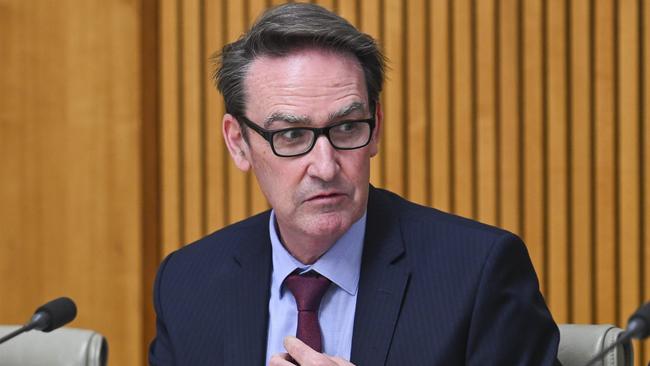Steven Kennedy accused of politicising Treasury in costing Coalition’s business lunch tax deduction
After running the ruler over the Coalition’s tax deduction for small business lunches, Treasury secretary Steven Kennedy stands accused by the Coalition of politicising the public service.

Treasury secretary Steven Kennedy has come under fire from the opposition over claims he was complicit in the politicisation of the public service, after Jim Chalmers ordered his department to run the ruler over the Coalition’s plan to roll out a tax deduction for small business lunches.
The costings, released by the Treasurer on Tuesday, disputed the $250m two-year price tag of the opposition’s policy, which had been conducted by the Parliamentary Budget Office. Instead, Treasury estimated that the proposal could cost up to as much as $10bn a year.
Opposition Treasury spokesman Angus Taylor – who continued to fend off criticism of his policy after it was widely canned by economists and Labor – criticised Treasury for its involvement in costing the proposal, demanding an explanation from Dr Kennedy.
“I’ll be writing to the Treasury secretary Steven Kennedy today, asking him for an explanation as to how this has come about,” Mr Taylor told reporters in Canberra, arguing that the move amounted to an “egregious politicisation” of the public service.
“The public service is not there to make political attacks on the opposition,” he said.
“That’s not the purpose of a public service, but that is how it is being used by this Treasurer.”
Dr Chalmers dismissed the accusation, claiming Mr Taylor was “losing the plot”.
He said he owed it to the Australian public to inform them of the policy’s expense in the absence of the Coalition putting out its own costing, which it has thus far refused to release.
“Part of my job is to understand risks to the budget, and this is a very substantial risk to the budget,” Dr Chalmers said.
“This would smash the budget.
“So I’ve taken this step to inform myself and the Australian community what the implications of this policy would be.”
The discrepancy between Treasury and the PBO’s separate costings is likely to do with the assumptions behind the number of small businesses that take up the measure and the amount they are able to deduct.
Despite coming under pressure to release the Coalition’s costings – which would allow firms with a turnover of up to $10m to exempt business-related meal and entertainment expenses up to $20,000 from fringe benefits tax – Mr Taylor was still unable to produce the PBO analysis.
“We’ll put out our costings ahead of the election, as is the convention, as [the] Labor Party did at the last election,” he said.
Mr Taylor’s accusations of politicisation echo similar comments made by then-opposition Treasury spokesman Chris Bowen in the lead-up to the 2019 election after the Coalition commissioned departmental analysis that costed Labor’s proposed tax plans at $387bn.
At the time, Dr Kennedy’s predecessor, Phil Gaetjans, stood by Treasury’s costings on the grounds that the request from the then-Morrison government made no reference to the fact that the policies were those of Labor.
Veteran budget watcher Chris Richardson said both Labor and the Coalition were culpable of employing Treasury’s costing process for their own political gain.
“Our institutions have never been more valuable to Australia, and the way that both sides have so embarrassingly used those institutions as weapons of war truly devalues them,” he said.
Mr Richardson, however, dismissed Treasury’s estimate for the Coalition’s tax deduction proposal, arguing that it far exceeded their actual cost.
“It’s a terrible policy, but it’s not terribly expensive,” Mr Richardson said.




To join the conversation, please log in. Don't have an account? Register
Join the conversation, you are commenting as Logout